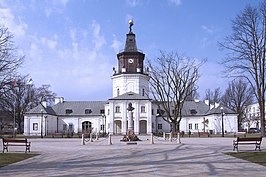General Casimir Pulaski Monument Project
A national fundraising campaign was executed for the restoration of the General Casimir Pulaski Monument in Savannah, GA. As a result of this ACPC initiative, the human remains found under the monument, were officially accepted as those of General Pulaski. ACPC representatives served on the Savannah committee which arranged for the public reinterment ceremonies which took place in October 2005 with the participation of high-ranking representatives of the Polish and United States governments, military guests, Revolutionary War re-enactors, and Polonia groups and civic organizations.
The ACPC continues the project of honoring General Pulaski’s place in history by periodically scheduling its board meetings in Savannah and attending battle reenactments staged on the anniversary of the Battle of Savannah in early October as well as sponsoring several plaques among those placed on the battlefield to honor individuals who fought along with General Pulaski.
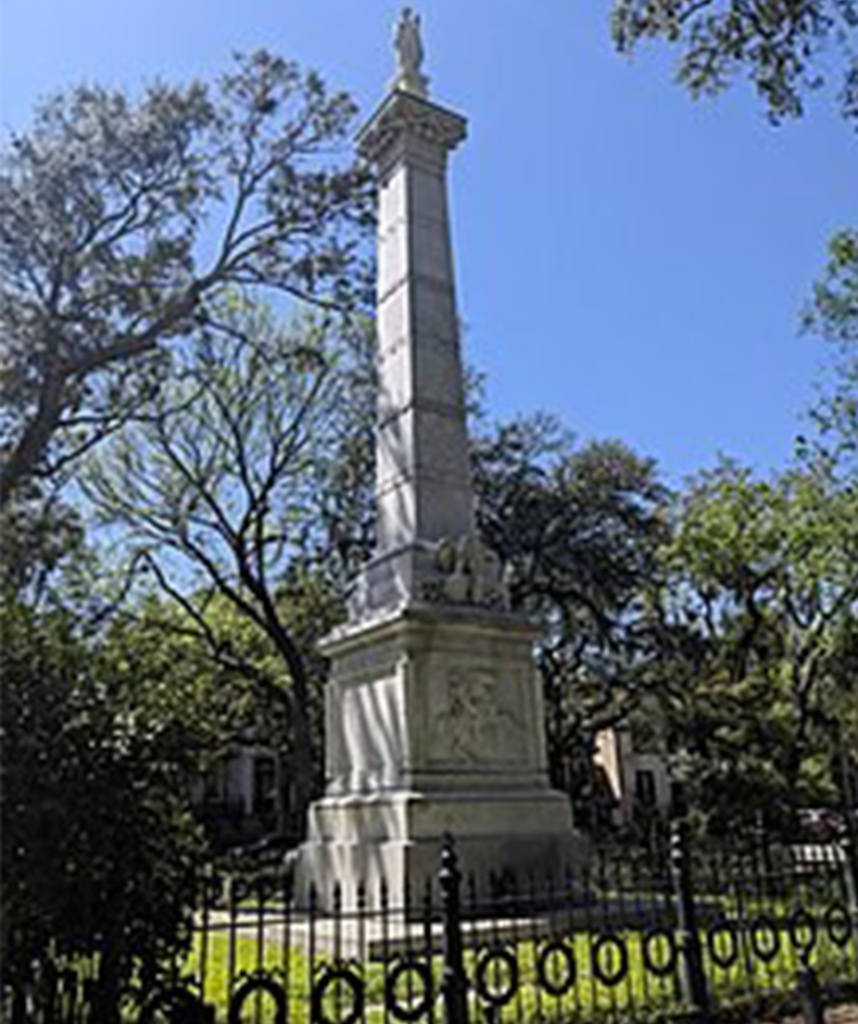
Learn more about the upcoming Savannah project event.
Cyprian Kamil Norwid at Harpers Ferry Museum
The John Brown-Cyprian Norwid Memorial in the John Brown Museum at the Harpers Ferry National Historical Park in West Virginia was a project of the American Council for Polish Culture which was spearheaded by members of the Polish American Arts Association of Washington, DC.
The dedication of the Memorial, including the unveiling of sculptor Gordon Kray’s plaque, designed to conform to the 19th century ambience of the Museum, took place at Harpers Ferry National Historic Park on October 20, 1990. In addition to welcoming remarks by Alfred Bochenek, the dedication ceremony featured presentations by ACPC President Kaya Ploss; Donald Campbell, Superintendent of the Harpers Ferry National Park; John Johnson, assistant to the Executive Director of the NAACP; and Kazimierz Dziewanowski, Ambassador to the United States from the Republic of Poland.
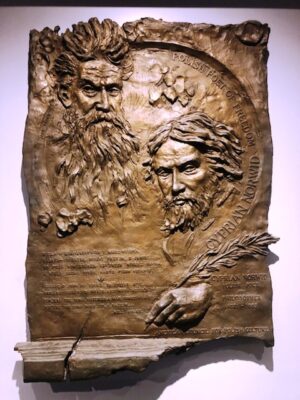
Cyprian Kamil Norwid was a 19th-century Polish poet, dramatist, painter, and sculptor whose stature as a humanitarian and freedom fighter was not fully understood or appreciated until decades after he died in 1883.
Norwid was the scion of impoverished Polish nobility born into partitioned Poland whose search for artistic success took him to numerous European cultural centers. During this odyssey, Norwid lived briefly in New York City, where he became familiar with the divisive issue of slavery, an institution that he related to the plight of his own subjugated country. In 1859, when John Brown was arrested and eventually hanged for his attack on federal property in Harpers Ferry, Norwid wrote two poems commemorating the abolitionist: “Do Obywatela Johna Browna” (“To Citizen John Brown”), and a second entitled simply “John Brown.”
In 1989, Alfred Bochenek, a former president of the PAAA, serving as Chairman of the ACPC Cyprian Norwid Memorial Committee, led a campaign to convince the National Park Service to establish a John Brown-Cyprian Norwid Memorial at the John Brown Museum. The centerpiece for the memorial was a stunning bronze plaque featuring the portraits of Brown and Norwid designed and executed by Washington sculptor Gordon Kray.
Jamestown Historic Marker
The ACPC led an initiative for the placement of a historic marker at the Jamestown Visitor Center, in Jamestown, Virginia, which informs thousands of annual visitors to this historic site of the first permanent English settlement in North America, of the important contribution made by Polish craftsmen and artisans to early American history in 1608. The Marker reads as Follows:
Skilled craftsmen of Polish origin recruited by the Virginia Company began arriving in Jamestown aboard the Mary and Margaret about 1 Oct. 1608. Poles contributed to the development of a glass factory and the production of potash, naval stores, and wood products. Soon samples of their work were shipped back to England. The workers were so highly prized that they were assigned apprentices so that their skill “shall not dye with them.” Capt. John Smith praised their work ethic in his writings. Court records indicate that as a result of a labor dispute, Poles were granted full voting rights on 21 July 1619.
The dedication ceremony took place on July 18, 2012, during the ACPC’s annual convention. Debbie Majka, president of the ACPC at the time, presided over an event that included many notable dignitaries.
Piotr Konowrocki, Consul General of the Republic of Poland brought greetings and good wishes from the Polish government and diplomatic corps on that significant occasion. A photo from the dedication, right.
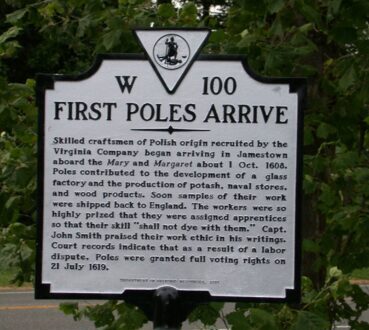
Polish Perspectives Exhibit at the National Council for the Social Studies
Founded in 1921, the National Council for the Social Studies is the largest professional association in the country devoted solely to social studies education. The ACPC has been affiliated with the NCSS since 2000. NCSS conferences stand as the singular event in America dedicated to providing history, social studies, geography, US and world history, and civics resources to educators. Conferences regularly draw a few thousand educators and over 200 exhibitors.
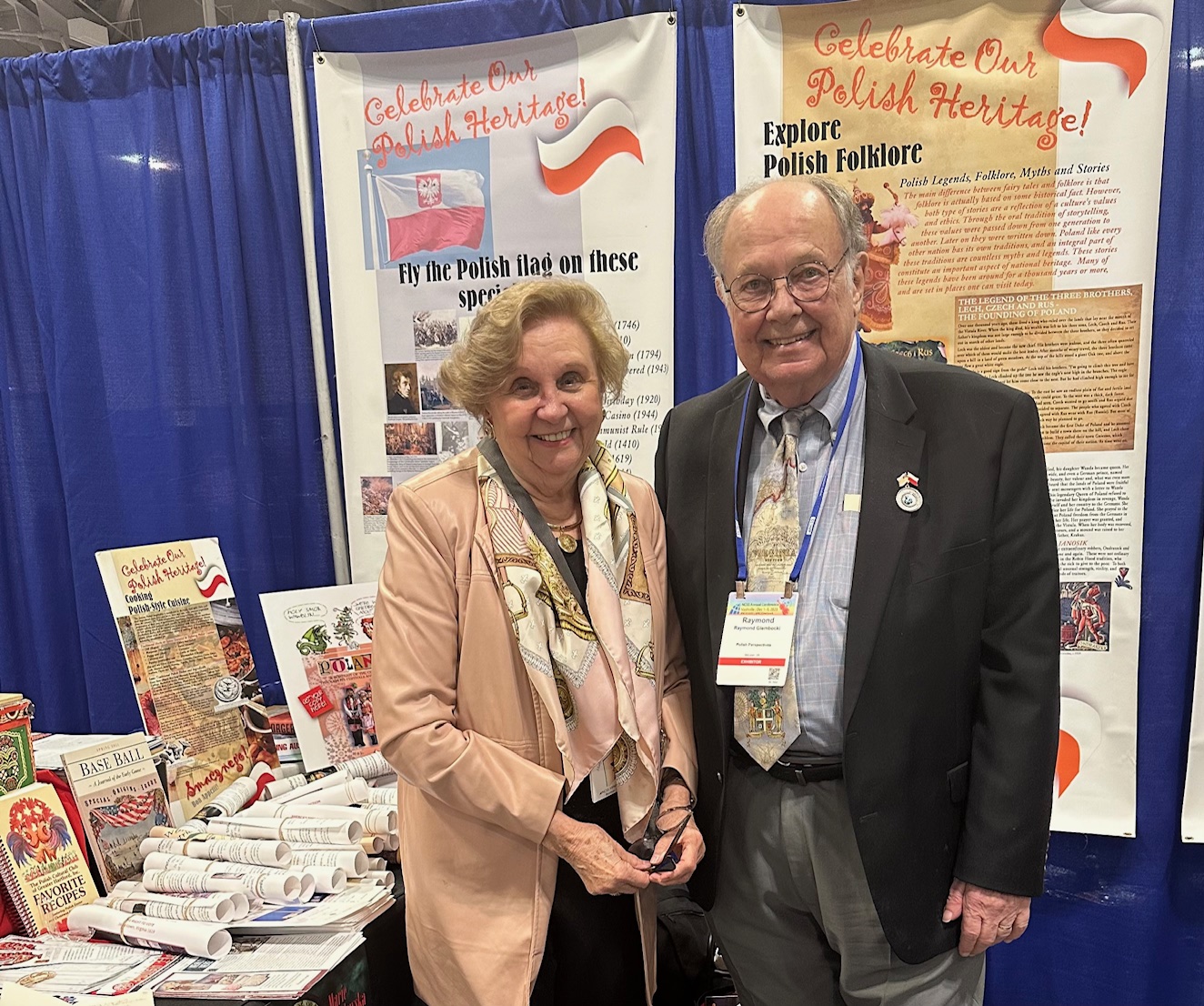
ACPC’s annual exhibit at NCSS conferences owes its existence to the generous sponsorship of major contributors such as the Polish American Congress-Charitable Foundation and the American Council of Polish Culture. Numerous ACPC affiliates, Polish organizations, and individuals have also played a crucial role in supporting this effort. Their collective contributions have made this Polish showcase a meaningful and enriching experience for all attendees.
Educators, teaching consultants, and university representatives are always seeking meaningful educational materials for their history, social studies, geography, and civics classes. The ACPC meets their needs by providing materials focused on Poland and American Polonia.
ACPC’s educational materials are presented as leaflets, posters, books, bookmarks, CDs, and DVDs. A prime example is a brochure that addresses Poles’ contribution to the Jamestown colony beginning in 1608. They were skilled in making such products as tar, pitch, resin, and glass. Their work stoppage in 1619 gained them the right to vote and they established the first apprenticeship program in the New World. Leaflets have featured notable Poles such as Casimir Pułaski, Marie Curie, Nicolaus Copernicus,
Thaddeus Kościuszko, Fredrik Chopin, Ignacy Paderewski, and others. Large historic background panels, such as those pictured in the photo, are available for use for affiliate and supporting organizations. Any educational materials can be requested for your organization’s use by contacting NCSS Committee Chairpersons, Raymond and Cecelia Glembocki at virginiaegg@cox.net. Access to these materials is one of the major benefits of being an ACPC affiliate or supporting organization.
Another major benefit of ACPC’s relationship with NCSS is the opportunity to develop relationships with many institutes, foundations, societies, and notable individuals who are eager to utilize ACPC materials in their already existing programs, thus spreading Polish history, culture, and traditions.
A complete 2023 NCSS convention report is available to all ACPC affiliates and supporting organizations by simply contacting NCSS Committee Chair Cecelia Glembocki at virginiaegg@cox.net.
Here you can find free Polish Perspectives educational materials for teachers
Polish Posters Project
In 1996, the ACPC initiated an exhibit of (15) Polish posters from collections owned by Iga Majewska-Trzcinski and Peter Obst. The posters were framed and made available to be shipped to ACPC member organizations and other groups.
Interest in posters produced by Polish artists has grown tremendously. Indeed, they have become highly prized by collectors in the United States, and around the world. Spanning the range from the humorous and clever, to the grotesque and shocking, these works impress even the casual viewer with their uncanny ability to present an idea in a dramatic way.
For almost 100 years the wall poster had been a common way of relaying information. But in Poland it attracted the interest of serious artists who, following in the footsteps of Toulouse-Lautrec, gave it a depth then unseen in the graphic arts. After World War II the medium was pressed into the service of the new socialist state, but artists soon discovered that they could use it to convey veiled protest and views out of line with official policy.
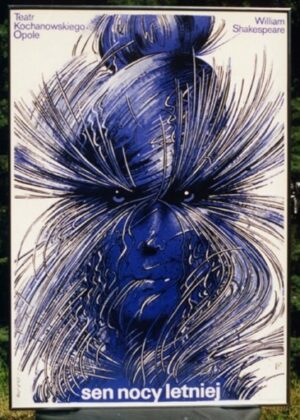
The Poster Exhibit has been presented at many places in the United States. The Exhibit continues to be available for use by member organizations. Please contact Peter Obst at peterpjo@aol.com for more information. A new set of posters is in the process of being created.
American Center of Polish Culture, Washington, DC
The ACPC purchased a building and founded the American Center of Polish Culture in Washington, DC. It was dedicated in 1992 and operated under the name Polish National Center until 2010. Since then, it has been the home of the Kościuszko Foundation’s Washington Office, which hosts many Polish cultural events throughout the year.
Computer Community Center
In 1992 the ACPC established a model Computer Community Center in Siedlce, Poland, the first community computer center in Eastern Europe. Siedlce was in an economically depressed region of Poland at the time. The ACPC raised $50,000 to equip the Center. The Center continues to function today.
The city of approximately 77,000, founded in the 10th century, is located in eastern Poland and is a part of the historical province of Lesser Poland.
